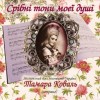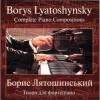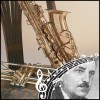Biography
Borys Mykolayovych Liatoshynskyi or Lyatoshynsky (January 3, 1895 – April 15, 1968) was a composer, conductor, teacher, and leading member of the new generation of twentieth century Ukrainian composers.
Borys Lyatoshynsky was born in Zhytomyr (also the birthplace of Sviatoslav Richter), in the Russian Empire (now Ukraine). His father, Mykola Leontiyovych Lyatoshynsky, was a history teacher and activist in historical studies. He was also the director of various gymnasiums in Zhytomyr, Nemyriv, and Zlatopol. Lyatoshynsky's mother played the piano and sang.
Lyatoshynsky started playing piano and violin at 14, he wrote a mazurka, waltz, and quartet for piano. He also attended the Zhytomyr Gymnasium, from where he graduated in 1913. After graduating, he attended Kiev University and later the newly-established Kiev Conservatory where he studied composition with Reinhold Gliere in 1914. Lyatoshynsky graduated from Kiev University in 1918 and from the Kiev Conservatory in 1919. During this time, he wrote String Quartet No.1, op.1, and Symphony No.1, op.2.
In 1920, Lyatoshynsky began teaching music theory at the Kiev Conservatory. From 1922, he taught composition. From 1922 to 1925 he was in charge of the Association of Modern Music in the name of Mykola Leontovych (his father's name). From 1935 to 1938 and from 1941 to 1944 he taught concurrently at the Moscow Conservatory. He wrote a variety of works, including five symphonies, symphonic poems, and several shorter orchestral and vocal works, two operas, chamber music, and a number of works for solo piano. His earliest compositions were greatly influenced by the expressionism of Scriabin and Rachmaninov (Symphony No.1). His music later moved toward surrealism (Schoenberg, Shostakovich). This caused significant problems with Soviet censors. Lyatoshynsky was accused (together with Prokofiev and Shostakovich) of formalism and creation of degenerative art. Many of his works were rarely or never performed during his lifetime. The 1993, a recording of his symphonies by the American conductor Theodore Kuchar and the Ukrainian State Symphony Orchestra (Marco Polo) brought his music to worldwide audiences.










![Complete Symphonies - Kuchar [3 CD] (CD 1)](http://static.classicalm.com/repository/composition-cover/small/10867-img1311630346190396.jpg)
![Complete Symphonies - Kuchar [3 CD] (CD 2)](http://static.classicalm.com/repository/composition-cover/small/10869-img1311630664249007.jpg)
![Complete Symphonies - Kuchar [3 CD] (CD 3)](http://static.classicalm.com/repository/composition-cover/small/10871-img1311631615129645.jpg)